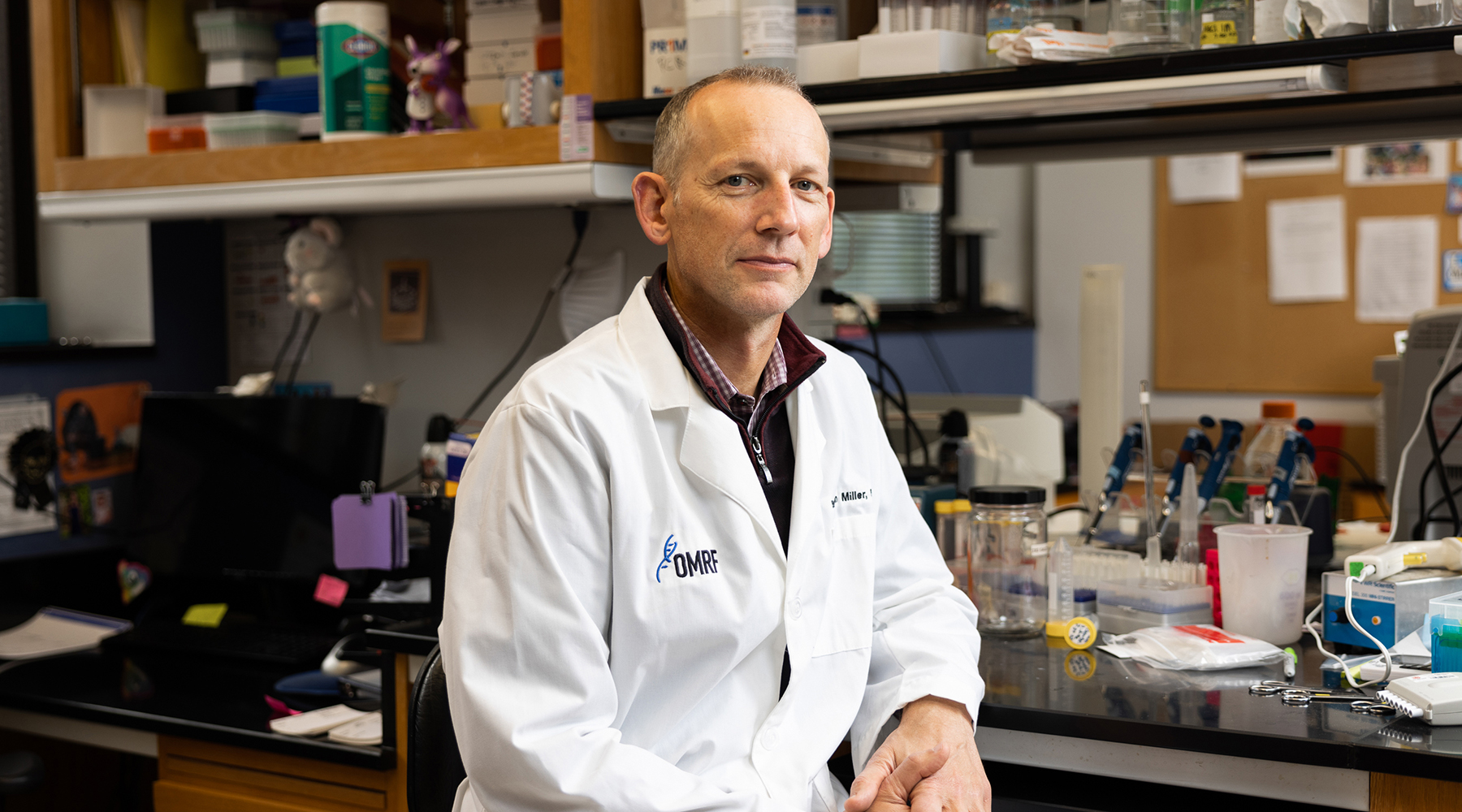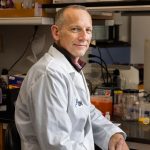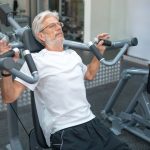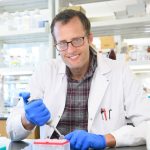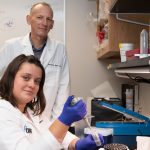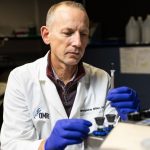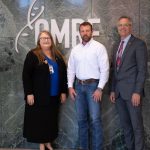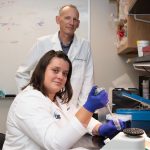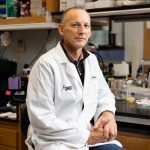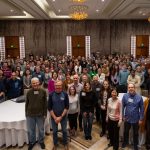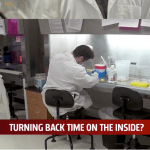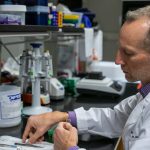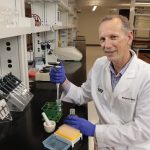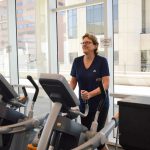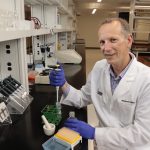Benjamin Miller, Ph.D.
Professor and Program Chair
Aging & Metabolism Research Program
G.T. Blankenship Chair in Aging Research
My 101
It is projected that by 2035, the number of people in the US over the age of 65 years old will be greater than the number of people below 18 years old. This projection illustrates the massive shift in the United States to an aged population. With the aging population comes challenges because of the increase costs and burdens of the diseases that accumulate with age. In our lab, we study the aging process in order to understand how to make people age slower. Our goal is not to make it possible to live 150 years, but rather to extend the period spent free of disease. In other words, rather than increase the lifespan, we aim to increase the healthspan. Of particular interest to our lab is how to maintain muscle, which is important for maintaining independence and a healthy metabolism.
In our laboratory we use models that live longer than they should, to understand what gives rise to increased healthspan. We focus on how to maintain proteins in a “young” state so that cells and tissues can continue to function normally and absent of disease. Of particular interest are mitochondria since these cellular organelles seem to be central to the aging process. Our research seeks to determine if we can maintain the quality of proteins in mitochondria to maintain overall health. In a tissue like muscle, it is our hope that maintaining mitochondria will help preserve muscle function with age. Importantly, it is always our goal to take what we learn in our laboratory experiments and translate them into human treatments that improve human healthspan.
Research
Maintaining proteostasis with aging: The Geroscience Initiative identified proteostasis as one of the seven “pillars” of aging research. Proteostasis refers to the processes that maintain proteome fidelity. My research focuses on the biosynthesis and turnover components of proteostasis. In this regard, we make direct measures of these dynamic processes, not markers or indicators, which has led to important insight into shared characteristics of slowed aging. By using stable isotopes to simultaneously measure both protein synthesis and DNA synthesis in vitro and in vivo we have made two discoveries: 1) mitochondrial proteins are selectively translated in slowed aging models, and 2) when accounting for cell proliferation, the turnover of proteins in existing cells is increased, not decreased. These findings are repeatable in several slowed aging models and slowed aging treatments.
Translation of treatments to slow aging: It is my goal to translate our more basic science into potential human treatments to slow aging. We do this using unique animal models and with clinical trials in humans. My work in humans has focused either on exercise, metformin, or Nrf2 activation. More specifically, we have investigated the efficacy of these treatments to slow age-related declines in skeletal muscle mitochondrial function and skeletal muscle mass. For example, some in the aging field are pushing metformin to be the first drug used to treat aging. We have data both in support and against such use. It is clear to us that the field needs more evidence before pushing such an expensive clinical trial.
Approaches: Stable isotopes and mass spec are key features of my research program. In this regard, I consider our lab a leader in the use of D2O to measure in vitro and in vivo biosynthetic processes. We are working on methods to expand these approaches in order to continue to improve measurements of kinetic processes. I also have extensive experience in using stable isotopes for the assessment of metabolic flux. In combination these approaches allow us to explore the interface between protein and energetics.
Brief CV
Education
B.S., Kinesiology, University of Wisconsin, Madison, WI, 1995
M.S., Kinesiology, University of Wisconsin, Madison, WI, 1998
Ph.D., Integrative Biology, University of California, Berkeley, CA, 2002
Honors and Awards
American Physiological Society Young Investigator Award, Environmental and Exercise Physiology, Washington, DC, 2004
American Physiological Society Journals Star Reviewer, 2014, 2015, 2022
Fellow, American Physiological Society, 2019
Impact Award (Midcareer award) American Physiological Society, 2020
Fellow, Gerontological Society of America, 2021
Merrick Award for Outstanding Medical Research, OMRF, 2022
Professional Activities
Associate Editor and Deputy Editor in Chief, Journal of Applied Physiology, 2014-2023
NIH Ad hoc review, 2016-present
NIH Standing Study Section: Aging Systems and Geriatrics, 2017-2021
Oklahoma City Nathan Shock Center Co-Director
Associate Editor, GeroScience, 2020-present
Associate Editor, Journals of Gerontology Series A, Biological Sciences, 2021-present
American Physiological Society Finance Committee, 2021-present
American Aging Society Board of Directors, 2021-present
American Aging Society President Elect, 2023
Memberships
Fellow, American Physiological Society, 2018-present
American Aging Association, 2019-present
Fellow, American Gerontological Society, 2007-present
Joined OMRF’s scientific staff in 2018
Publications
Recent Publications
Gimla M, Olszewski S, Brown JL, Raymond-Pope C, Rigsby S, Peelor FF 3rd, Kwon HR, Yao L, Olson LE, Fuqua JD, Miller BF. Overactive PDGFRα and PDGFRβ promote distinct yet overlapping phenotypes of skeletal muscle fibrosis and stiffness, with PDGFRβ also driving drastic muscle growth. bioRxiv, 2026 January, PMID: 41509204, PMCID: PMC12776369
Kemna RE, Kueck PJ, Blankenship A, John CS, Johnson CN, Green ZD, Mayfield H, Yoksh L, Johnson L, Thyfault JP, Mahnken JD, Miller BF, Morris JK. Acute effects of lactate infusion on metabolism, AD biomarkers, and cognition: The LEAN study. Alzheimers Dement 21:e70984, 2025 December, PMID: 41376120, PMCID: PMC12696042
Deberneh HM, Taylor ME, Kobak KA, Kinter MT, Miller BF, Sadygov RG. Duplexing metabolic deuterated water-labeled samples using dimethyl labeling to estimate protein turnover rates. Commun Chem 8:375, 2025 November, PMID: 41298887, PMCID: PMC12658016
Selected Publications
Abbott CB, Lawrence MM, Kobak KA, Lopes EBP, Peelor FF 3rd, Donald EJ, Van Remmen H, Griffin TM, Miller BF. A Novel Stable Isotope Approach Demonstrates Surprising Degree of Age-Related Decline in Skeletal Muscle Collagen Proteostasis. Function (Oxf). 2021 May 10;2(4):zqab028. doi: 10.1093/function/zqab028. eCollection 2021. PMID: 34124684, PMCID: PMC8187230
Wolff CA, Lawrence MM, Porter H, Zhang Q, Reid JJ, Laurin JL, Musci RV, Linden MA, Peelor FF 3rd, Wren JD, Creery JS, Cutler KJ, Carson RH, Price JC, Hamilton KL, Miller BF. Sex differences in changes of protein synthesis with rapamycin treatment are minimized when metformin is added to rapamycin. Geroscience. 2020 Aug 5. Epub ahead of print. PMID: 32761290, PMCID: PMC8110668
Miller BF, Reid JJ, Price JC, Lin HL, Atherton PJ, Smith K. CORP: The use of deuterated water for the measurement of protein synthesis. J Appl Physiol (1985). 2020;128(5):1163-1176. PMID: 32213116
Konopka AR, Laurin JL, Schoenberg HM, Reid JJ, Castor WM, Wolff CA, Musci RV, Safairad OD, Linden MA, Biela LM, Bailey SM, Hamilton KL, Miller BF. Metformin inhibits mitochondrial adaptations to aerobic exercise training in older adults. Aging Cell. 2019 Feb;18(1):e12880. PMID: 30548390, PMCID: PMC6351883
Miller BF, Drake JC, Naylor B, Price JC, Hamilton KL. The measurement of protein synthesis for assessing proteostasis in studies of slowed aging. Ageing Res Rev. 2014 Nov;18:106-11. PMID: 25283966, PMCID: PMC4258117
Miller BF, Hamilton KL. A perspective on the determination of mitochondrial biogenesis. Am J Physiol Endocrinol Metab. 2012 Mar 1;302(5):E496–9. PMID: 22205627 PMCID: PMC3311289
Contact
Aging & Metabolism Research Program, MS 46
Oklahoma Medical Research Foundation
825 N.E. 13th Street
Oklahoma City, OK 73104
Phone: (405) 271-7767 or (405) 271-7760
Fax: (405) 271-1437
E-mail: benjamin-miller@omrf.org
For media inquiries, please contact OMRF’s Office of Public Affairs at news@omrf.org.
Lab Staff
Christiana Raymond-Pope, Ph.D.
Associate Staff Scientist
Agnieszka Borowik, Ph.D.
Assistant Staff Scientist
Amanda "Mandi" Stock, Ph.D.
Assistant Staff Scientist
Jordan Fuqua, Ph.D.
Senior Postdoctoral Scientist
Matthew Bubak, Ph.D.
Senior Postdoctoral Scientist
Jessica Halle, Ph.D.
Postdoctoral Scientist
Seongeun Kwak, Ph.D.
Postdoctoral Scientist
Paulo Mesquita, Ph.D.
Postdoctoral Scientist
Colleen O'Reilly, Ph.D.
Postdoctoral Scientist
Frederick "Rick" Peelor
Assistant Laboratory Manager
Wyatt Armstrong
Clinical Trial Exercise Trainer
Alexander "Alex" Chard
Clinical Trial Exercise Trainer
Kristen Stillwell
Clinical Trial Exercise Trainer
Jessica Thomason
Research Technician II
Hayden Zehrung
Research Technician II
Laura Quijano Sarraga
Research Technician I
Bre Thomas
Research Technician I
Jospeh Tuck
Research Technician I
Urszula Wasniowska
Research Trainee
Ashley Bell
Senior Laboratory Technician
Michael Taylor
Graduate Student
Jeannie Evans
Project Coordinator II
Holly Smith
Administrative Assistant III
Heather Spencer
Administrative Assistant III
News from the Miller lab

2020 had many downsides. But for Dr. Benjamin Miller, a year devoid of social engagements and work-related travel brought an unexpected gift: more time on his bike. A former elite amateur cyclist, Miller gets up before dawn most mornings to ride. He estimates he spends 10 to 15 hours cycling in a typical week, which […]
